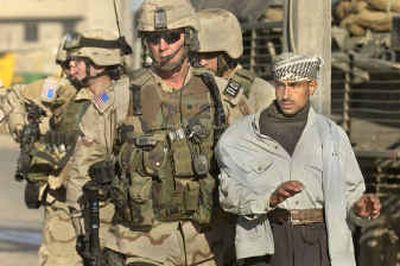Iraq bombings target police, Kurds; four U.S. soldiers die

BAGHDAD, Iraq – Suicide car bombs struck Iraqi police and Kurdish militiamen in Baghdad and northern Iraq on Saturday, killing at least 16 people and wounding dozens, while four U.S. soldiers died in separate attacks, again demonstrating the lethal reach of Iraq’s insurgency just weeks ahead of crucial elections.
The U.S. commander in Iraq, Gen. John Abizaid, acknowledged that the country’s homegrown forces aren’t yet up to the task of ensuring secure elections, requiring the planned increase in U.S. troops. More than 42 Iraqis have been killed in the past two days alone.
U.N. special envoy Lakhdar Brahimi criticized the military’s hardline approach to the insurgency and said credible elections cannot be held Jan. 30 under the current conditions.
Meanwhile, the insurgents pursued their deadly campaign against American troops and Iraqi security forces. Two U.S. soldiers were killed by roadside bombs in Baghdad and near Baqouba on Saturday, and two other American soldiers were killed and four wounded when their patrol came under attack in Mosul.
Also Saturday in Mosul, a suicide bomber blew up his vehicle alongside a bus carrying Kurdish militiamen in the city, killing at least nine people, including seven militiamen and two passers-by, and wounding nine more, officials said. Along with Iraq’s majority Shiites, Kurds back the upcoming elections, and the bombing may have been an attempt to drag them into a civil war.
With the country still so unstable, the U.S. military plans to increase its troop strength from 138,000 to about 150,000 by mid-January – slightly more than during the 2003 invasion that toppled Saddam Hussein’s regime – to try to keep order during the vote. The primary concern is Iraq’s Sunnis, who generally oppose the vote and are believed to be fueling the insurgency.
Abizaid admitted the troop increase wasn’t what Washington had envisioned. “It had been our hope that we would be able to have a combination of increases that mainly were Iraqi troops’ increases,” said Abizaid, the head of U.S. Central Command. “And while the Iraqi troops are larger in number than they used to be, those forces have to be seasoned more, trained more. So, it’s necessary to bring more American forces.”
Speaking to reporters at a regional security conference in Bahrain, Abizaid declined to speculate on when the Iraqi forces would be ready or say how many they now number. But he said they were “constantly improving.”
Brahimi, however, said the United States and the Iraqi government should reconsider their reliance on force to eliminate insurgents.
In an interview published Saturday in a Dutch newspaper, the Algerian diplomat insisted the country cannot go ahead with the elections “if conditions remain the same.”
“It’s a mess in Iraq. The international community, hopefully with the Americans, must help the Iraqis to clean up the mess,” he said.
Officials had hoped the recent U.S.-led assault on the insurgent hotbed of Fallujah would put the rebels on the defensive. But the latest attacks showed they are still highly capable of hitting back where they choose.
Saturday’s car bombs in Baghdad went off nearly simultaneously at about 9:30 a.m. by a police station across the street from a checkpoint leading to the heavily fortified Green Zone, which houses Iraqi government offices and several foreign missions.
Health officials said the bodies of seven people killed by the blast and 59 wounded were brought to two Baghdad hospitals. Officials said most of the victims were police officers, but the identities of all the dead were not yet known.
Jordanian terrorist Abu Musab al-Zarqawi’s militant group claimed responsibility for the attack, as it had done for a highly coordinated assault on a police station west of Baghdad the day before in which insurgents killed 16 police, looted the station’s armory and freed dozens of prisoners. The claims appeared on an Islamic Web site and could not immediately be verified.
In eastern Baghdad, a roadside bomb killed an American soldier and wounded five others Saturday, the military said. Another bomb near the town of Ghalabiyah, six miles west of the insurgent hotbed of Baqouba, north of Baghdad, hit a truck in a U.S. military convoy, killing a soldier and wounding another, Master Sgt. Robert Powell said.
Two soldiers with U.S. Task Force Olympia, based in Mosul, were killed when their patrol came under attack Saturday, according to a military statement released today.
A suicide car bomb also hit an American forward operating base near Iraq’s border with Jordan on Friday, killing two U.S. service members, the U.S. command said Saturday.